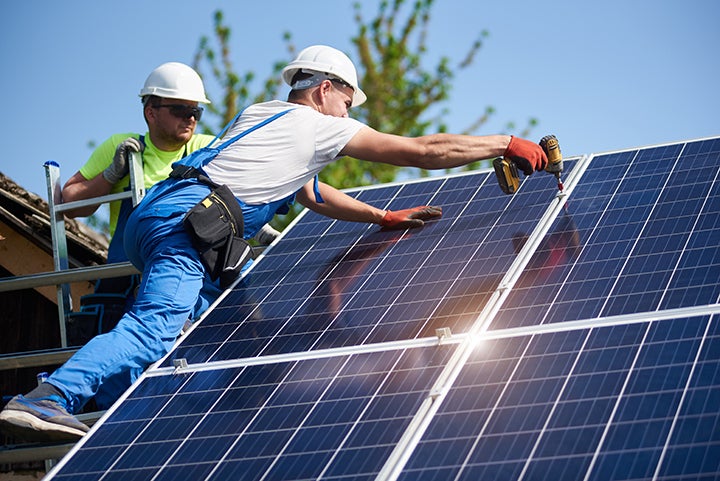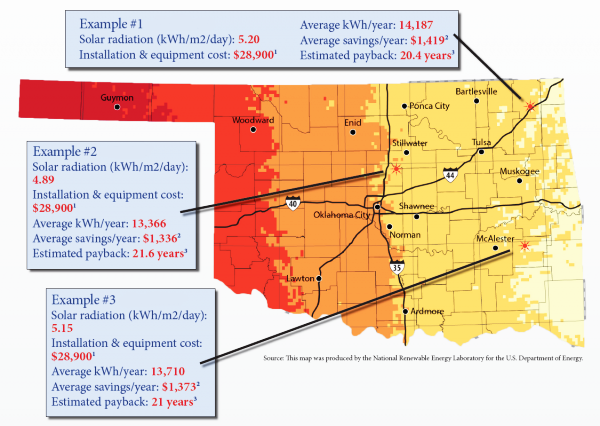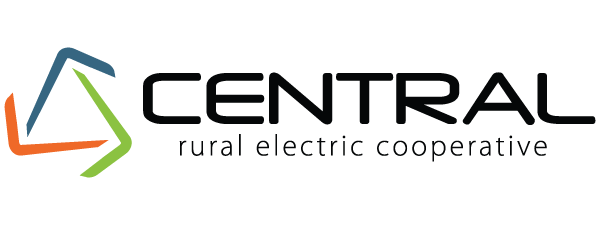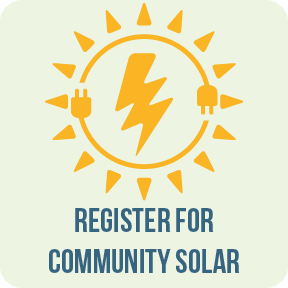Solar with Central
As your local energy experts, Central wants to be your first stop when considering any renewable energy. With so many options available, we want to make solar simple. Central can help you evaluate the risks and benefits of solar and assist in finding a solution that is right for you.
Interested in Solar? Let's talk!
Central is committed to helping our members find affordable, reliable and safe energy options. We want to make solar simple, helping you evaluate the risks and benefits of rooftop solar and finding a solution that is right for you.
Select the tab below you are interested in learning more about.
All about Residential Solar
Did you know Central has an application that members are required to have approved before solar panels can be installed? Central's interconnection application and agreement can be downloaded here.
Before you consider solar, consider these tips:
- Do your homework. Research various solar power systems and installation options before investing. Contact Central for a list of local vendors.
- Assess whether your property is a good site for solar. In general, you will need an open rooftop space or land that is free of shade for at least five hours per day.
- Investigate local building codes, zoning ordinances, covenants, and special regulations pertaining to solar power systems.
- Check with Central to determine the requirements and costs for connecting your system to the grid. Most likely you will still have a Central bill each month.
- Before adding an active solar system to your home, have your home’s electrical system evaluated by a licensed professional to ensure it can support this new technology.
- Always hire a professional to install solar panels at your home.
- Central’s interconnection process and approval can take up to 30 days and must be done before a build. Be sure and include this pending time in your timeline when installing solar.
Is solar energy right for me?
If you have made your home as energy-efficient as possible and now want to install a solar energy system, contact Central in the initial planning stages. Conduct thorough research on all aspects of any system before making the investment. Determine what your goal of the system is. For example, do you want to install solar energy because you believe it is the right thing to do? Or are you looking to save money? If you want to save money, carefully examine all the financial considerations first.
Start with energy efficiency
Before installing a solar energy system, consider reducing your energy use by making your home more energy-efficient. Many energy efficiency measures have a faster return on investment, and the initial investment is less than that of a renewable energy system. Central has energy efficiency rebates as well, visit the rebates page.


Financial considerations
When evaluating the potential of installing a solar electric system at a home or business, considerations should include:
- Solar access: Oklahoma is fairly good in comparison to other parts of the country. Site-specific access depends on installing the system so it is not shaded. See your location on the map for average output.
- Retail cost of residential electricity: Oklahoma is low in comparison to many other parts of the country. A lower electric rate makes the return on investment length longer than a higher electric rate.
- Available incentives: Solar energy systems may qualify for a federal tax credit of 30 percent, 26 percent in 2033 and 22 percent in 2034.
- The total cost of the system: The average installed cost of residential solar photovoltaic (PV) is $2.89/watt, or $28,900 for a 10-kilowatt grid tie-in system.1 In addition, there may be other costs to consider, such as liability, homeowners’ insurance and property taxes.
Given the information listed above, evaluate your situation to ensure installing a solar system makes sense financially for you.
1Solar Energy Industries Association (SEIA), U.S. Solar Market Insight Report 2018 Q3
Oklahoma's Photovoltaic Solar Resource
This map is measured in kilowatt-hours per square meter per day (kWh/m2/day), which represents insolation, the total energy on a surface over a specific time interval. Examples use the location’s solar resource to determine average output and savings per year, and were calculated using the National Renewable Energy Laboratory’s (NREL) PV Watts calculator using the default settings, including inverter efficiency of 96 percent. For more information, visit pvwatts.nrel.gov.
Your output may vary depending on site-specific factors and regular maintenance such as washing the panels several times per year. Output also may drop about 1 percent per year through the average 20-25 year lifespan of most systems.

Community Solar
Central members can now purchase electricity from a 500-kW solar array at Central’s campus.
Residential members can purchase blocks of 100-kilowatt hours for $4.58* per block. This cost is in addition to current rates. Only 340 blocks are available for purchase – so blocks will be offered as first-come, first-serve.
Central’s Community Solar project is an alternative for members who want to use solar power without having the expense and overhead of purchasing solar panels for their homes.
The Community Solar program embodies the cooperative way by bringing members together to meet the demand for sustainable energy and access to solar. Please click the link below or to the side to sign up.
*The community solar rate is subject to rate adjustments as approved by Central’s board of trustees.
Before installing a solar energy system, consider reducing your energy use by making your home more energy-efficient. Many efficiency measures have a faster return on investment, and the initial investment is often less. If you decide to install solar, make sure you are aware of all state and federal regulations. Verify the solar system under consideration meets the national electrical code. Review all aspects of any system before investing and work with Central throughout the process.
Central can help in the initial planning stages. We can assist you in determining the necessary safety equipment required for connecting your system to the grid and provide you with a copy of our cooperative’s policies and metering agreements on solar energy.
The average residential system is around 10 kilowatts; however, consider a number of factors when determining size. What parts of your home do you want to run with the system? Does that include air conditioning and heat? What is your average monthly kilowatt-hour usage and how much of that do you want your system to cover? A reputable dealer will be able to provide that information.
A typical individual residential solar panel measures about 18 square feet. An average size installation of a 10-kW array will require about 800 square feet of space, depending on rated wattage and technology. Consider these factors: age of your roof, roof replacement timeline, ability of your roof to support the weight of the panels, amount of shade on your roof, community or subdivision restrictions, etc. Roofs facing south generate maximum wattage.
Do your homework. Check out a list of reputable, long-term providers. Always get references and learn as much as possible about the companies you are considering. Because there are often a variety of systems and payment plans, it is always a good idea to get multiple quotes before choosing a vendor.
Central is more than 99.99 percent reliable. You will be able to rely on your cooperative to back up your solar generator and provide all your electricity needs. Remember, your system will only produce power while the sun shines and the power is on from the cooperative. If you choose to go off the cooperative’s grid and do not install backup storage batteries, you will not have electricity when the sun isn't shining. A backup battery system can easily double the cost of installation and add ongoing maintenance costs, but may offer solutions to preventing loss of power.
If you already have solar installed at your home, please contact a Central Member Solutions Representative by calling 800-375-2884. To ensure the highest of safety standards are met, Central will come out and inspect the installation and work with you on completing the Distributed Generation Interconnection Agreement.



